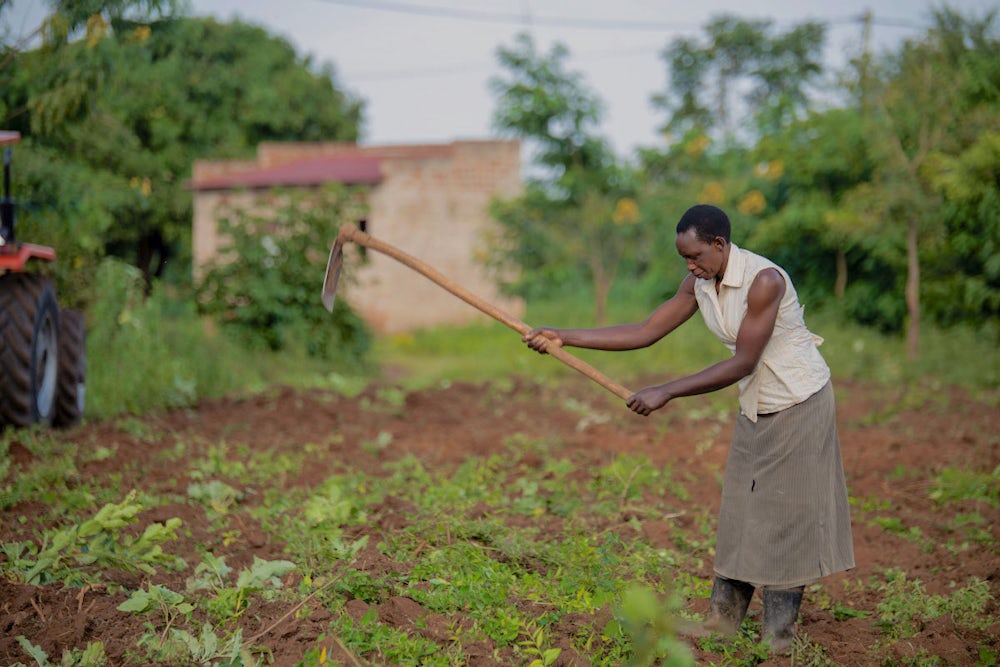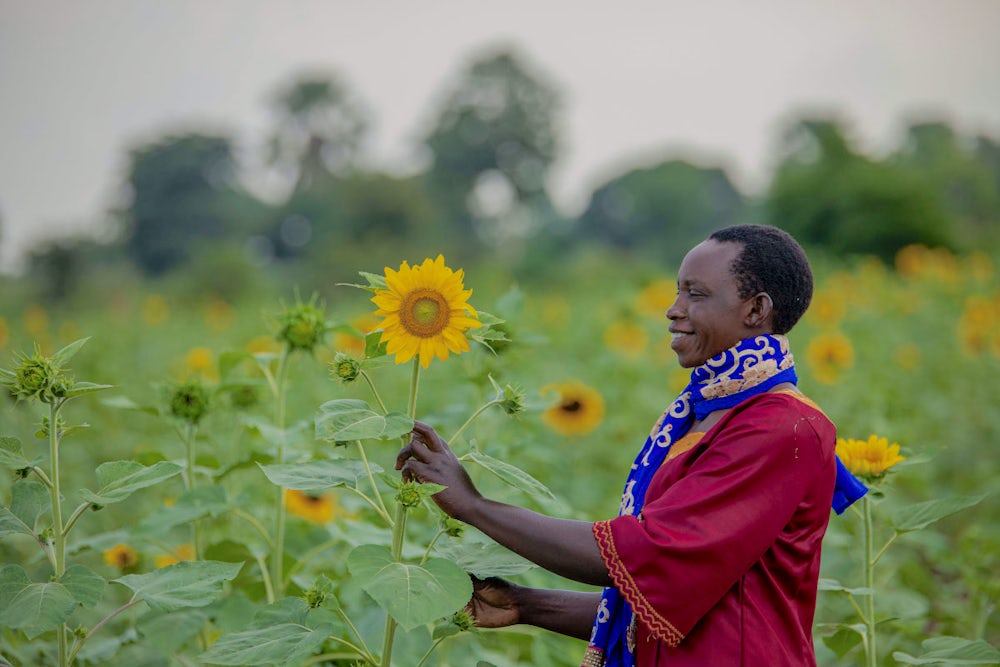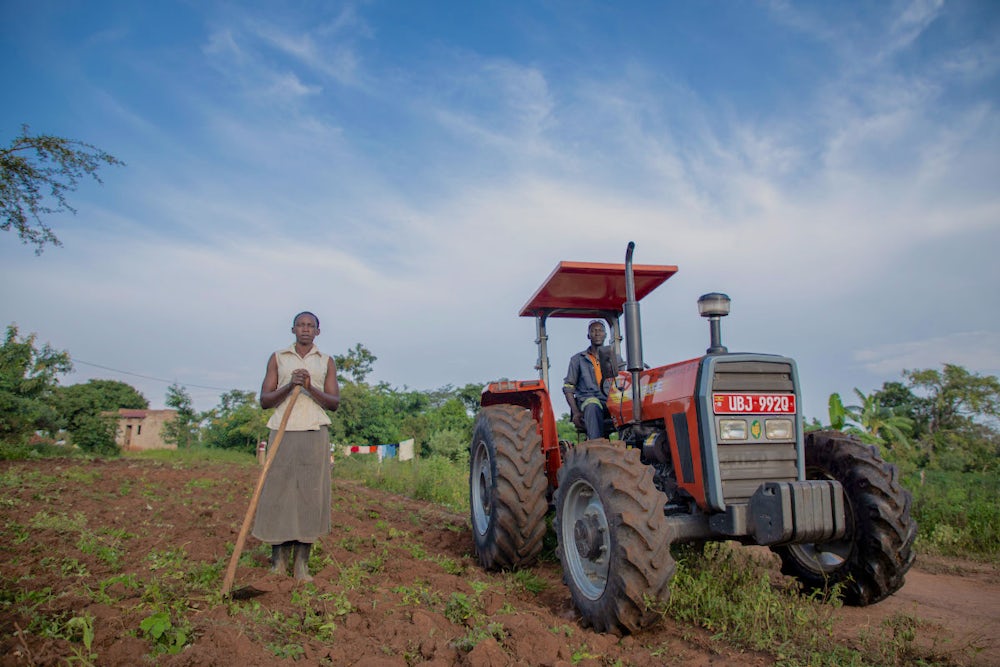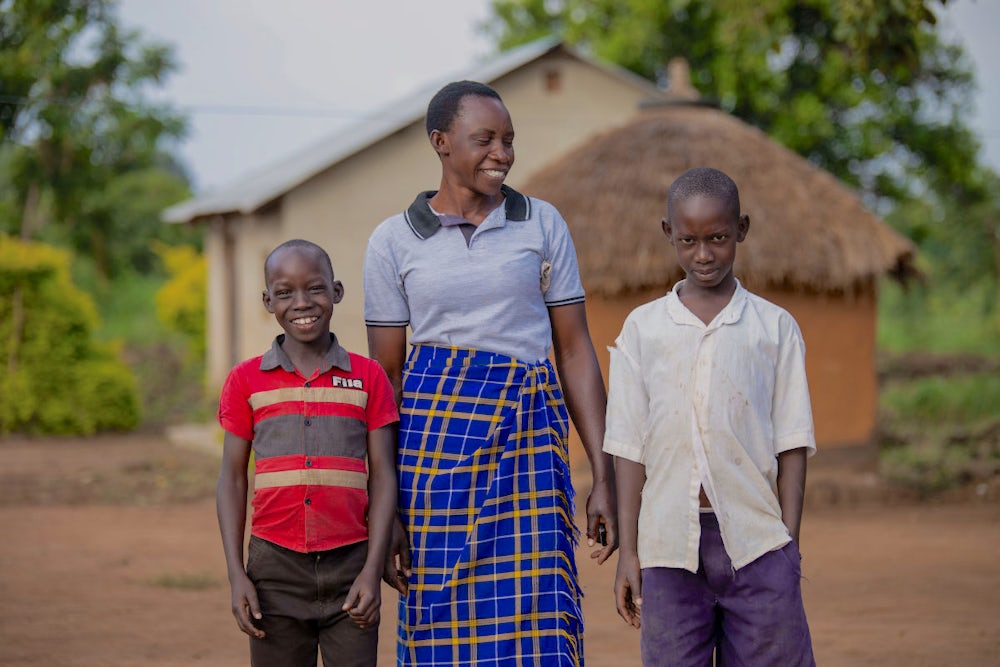Fatuma Auma is a smallholder farmer, a nursery school teacher and a mother of four. Having nurtured young minds for several years herself, Fatuma knows the critical role education can play in defining the future of children, families and even communities.
But in Dokolo District of northern Uganda, where Fatuma lives, unreliable livelihoods and inadequate income have restricted families from sending their children to school. The thought of not being able to provide this essential opportunity for her own children was a thought that has often distressed Fatuma.

Most of the population in Dokolo District live in poverty, and over 90% of families rely on subsistence farming to survive. Small land size, lack of technical knowledge to improve yield, and inadequate access to critical inputs and services like good quality seeds, farming equipment, credit and crop insurance keeps smallholder farmers in the area from increasing production and earning a sustainable living income. This adversely affects their capacity to ensure quality nutrition and health services for their families, and education for their children.
Before joining a Heifer project in 2018, Fatuma was battling similar challenges and described that phase of her life in a single word: “hard.”
Her family has 6 acres of land where they grow soybeans, sunflower, maize and simsim, or sesame. Despite running a nursery — attended by around 98 toddlers, including her two youngest children — and bringing additional income from their surplus harvest, the money Fatuma was making simply wasn’t enough to meet her family’s needs. After basic expenses, like food and clothing, Fatuma was not able to afford school fees for her two oldest children — until she got a chance to change her fate.

When Fatuma joined a self-help group started by Heifer’s Learn for Agribusiness project, she received training on improved agricultural practices, entrepreneurship and financial literacy. The project — a joint initiative with the Edukans Foundation — was launched to help young Ugandan farmers access the support, tools and training they need to improve their harvest, and increase their income to lead dignified lives.
Through the self-help group, Fatuma saw the way to provide her children with the life of opportunity she wished for them — by learning new skills, improving her yield and turning a higher profit. A few years later, she joined a registered cooperative established through the same project, the Dokolo Young Oilseed Farmers’ Cooperative.
A cooperative is a people-centered business driven by values of reciprocity and solidarity. For smallholder farmers worldwide, agricultural co-ops improve access to markets, supplies, knowledge and capital to grow their businesses and earn a stable income.
Through Dokolo Young Oilseed Farmers' Cooperative, Fatuma gained more knowledge and tools to help her improve the quality and quantity of her farm's yield. She learned new planting and crop management techniques, such as sowing seeds in a straight row, timely weeding and using environment-friendly pesticides, as well as new harvesting and post-harvest handling techniques. She also received a seed loan worth 150,000 Ugandan shillings, about $41, to strengthen her sunflower crop, and another loan worth 250,000 Ugandan shillings to help her start growing soybean.

At the beginning of each season, the cooperative provides tractor services to farmers at a nominal fee, which helps farmers like Fatuma plough their fields and save costs on engaging manual labor for digging the land. And when the harvest is ready, the cooperative buys the produce directly from Fatuma and transports it to the storage facility, saving her time and transportation costs.
“Farmers have embraced farming on a larger scale and good agronomic practices, which have improved their sales and quality of life,” Fatuma said. “In addition, friendships among members of the community have grown stronger.”
In a good season, Fatuma’s yields have more than doubled, and so have her profits. Even when she struggled through a particularly hot dry season, making only one-quarter of the income she expected to, crop insurance provided by the cooperative helped ease the losses and make up the difference.

The profit Fatuma has earned from her harvests have helped her run her household, keep her children in school, pay back her loans, purchase a cow and construct a storage facility on her land, an investment that will help her save costs and diversify her sources of income.
“I had no ways of meeting my children’s needs,” Fatuma shared. “[Now] we are happy. The children get fees and requirements for school.”
Fatuma has not been alone in her success. More than 3,880 youth participants — organized into 135 youth groups — are enrolled in the project. Nearly 2,400 youth participants have increased their income by 70% with the help of skill development training. Through project-supported cooperatives, these participants can now leverage market linkages, avail micro-loans to invest in their businesses and increase their income.
Fatuma’s home compound still remains full of children reciting lessons, flipping pages of their notebooks and playing games. And for Fatuma, a stronger farm and jump in income have opened the door to resilience, enabling her to keep her own children in school and on the path to a productive future.